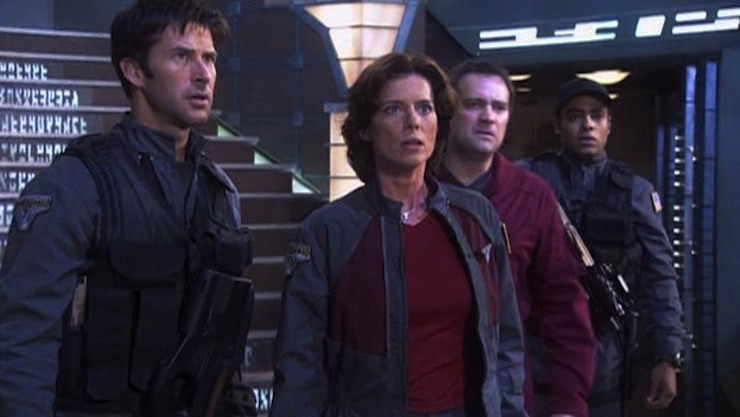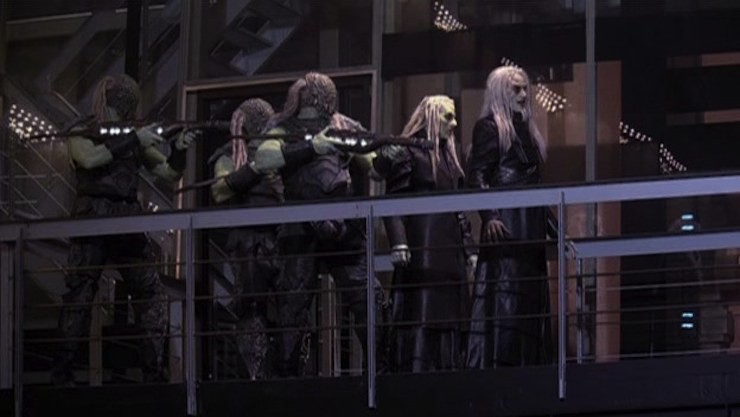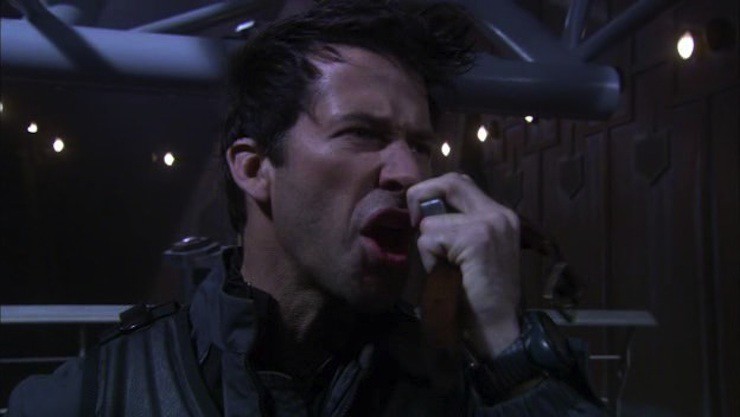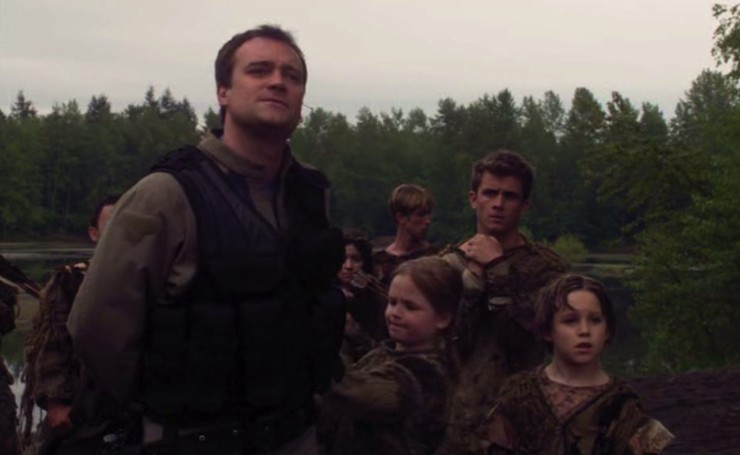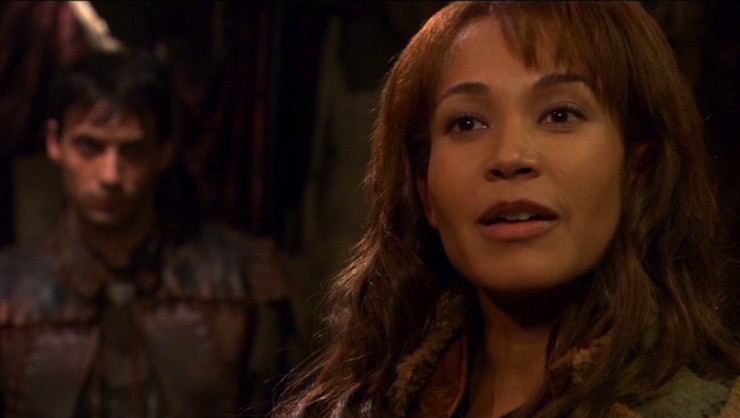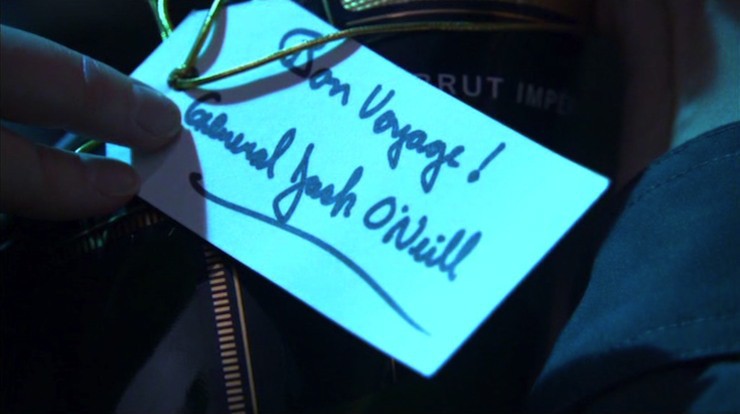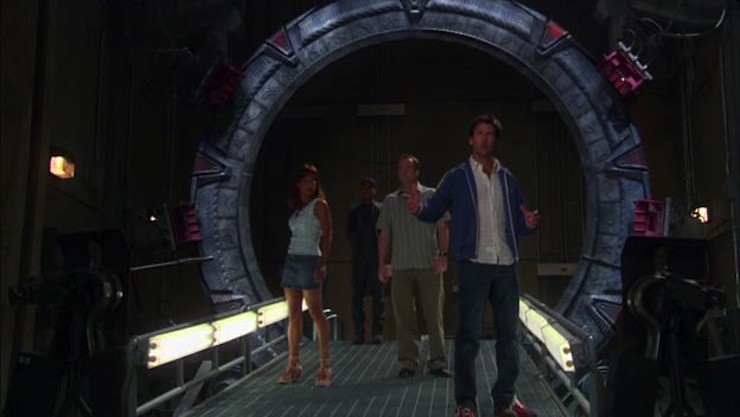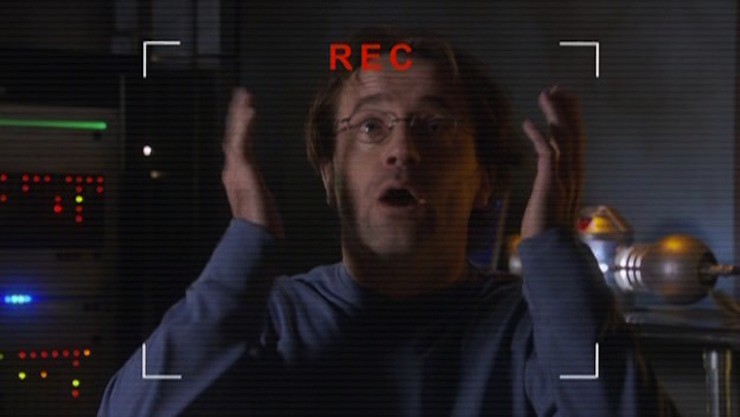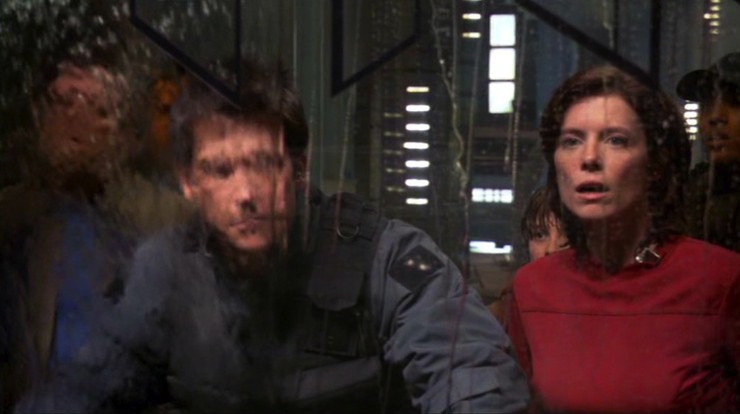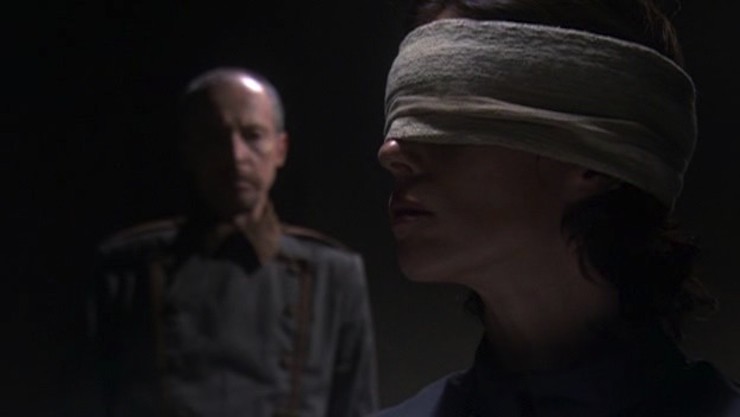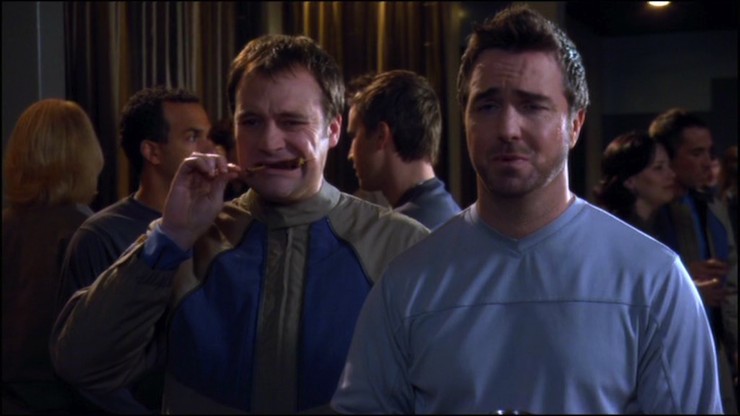Stargate Atlantis Season 1
Executive producers: Robert C. Cooper, Brad Wright
Original air dates: July 16, 2004 – March 25, 2005
Mission briefing. After being relieved of command of the SGC, Weir is assigned to head up the international coalition of scientists who are examining the Antarctic Ancient base SG-1 discovered in “Lost City.” Jackson discovers an eighth chevron that finishes the gate address to the lost city of Atlantis in the Pegasus Galaxy. There’s just enough power left in the Antarctic ZPM to power a single wormhole to Pegasus.
O’Neill approves an expedition led by Weir, with Colonel Marshall Sumner in charge of a contingent of Marines, among them Lieutenant Aiden Ford and Sergeants Bates, Markham, and Stackhouse. The scientists include Dr. Rodney McKay, Dr. Peter Grodin, Dr. Carson Beckett, Dr. Radek Zelenka, and many many many more, who are willing to give up their lives to see what’s on the other side of that gate address in Pegasus. In addition, an Air Force pilot with a checkered history, Major John Sheppard, discovers that he has the Ancient gene that allows him to use Ancient tech, and is convinced by Weir and O’Neill to join the expedition.
They find the lost city of Atlantis—but it’s underwater, the ocean held back by a force field that’s powered by a nearly depleted ZPM. They need to find another power source. Instead, they find the Wraith, the local bad guys. Vampiric creatures who suck the life force out of humans, they actually defeated the Ancients, forcing them to sink the city and retreat back to the Milky Way.
The Wraith cull the human populations of the worlds in Pegasus, then, once those worlds are depleted, go into hibernation for a century or two until the populations build back up to subsistence levels for them. But the presence of the Atlantis expedition awakens the Wraith some five decades early.
Atlantis takes in the Athosians, whose world is overrun by the awakened Wraith. The city itself has a failsafe that allows it to surface when the force field fails. But along the way, Sumner is interrogated and sucked almost dry by a Wraith—Sheppard is forced to shoot him to keep him from suffering any further at the Wraith’s hands. They encounter the Wraith several more times, and not everyone gets out alive when they do.
Over the course of the next several months, Atlantis—aided by Teyla Emmagan, one of the Athosians, and with Sheppard now in charge of the military matters in the city—try to find a ZPM that would allow them the power to dial Earth, and also use the shield again in case the Wraith attack the planet. They find one on a planet full of kids, but the kids need it to keep their duonetic field (whoops, wrong franchise) working, and another being kept by a secret society dedicated to holding onto it for the Ancients, who won’t give it to the expedition because they’re not actually the Ancients.
They also make a bunch of new friends, including the Hoffan—though relations are strained due to the Hoffan’s fanaticism. They create a drug that makes people immune to the Wraith, but it has two issues: it kills half the people who take it and it actually kills the Wraith, which will make the aliens’ reaction to it dangerously provocative. Still, the drug will prove useful going forward.
Our heroes also acquire a rather huge new enemy: the Genii, who pose as farmers but are actually a World War II-level society constructing nuclear weapons to use against the Wraith. Lack of trust dooms any potential alliance, and the Genii try to take Atlantis when the city is down to a skeleton crew thanks to a massive hurricane.
Other fun things they find in Pegasus include an Iratus bug that nearly kills Sheppard, an ascended Ancient who is punished with protecting a small group of people from the Wraith forever, and aliens that create hallucinations making the team think they’ve returned to Earth.
The city itself has plenty of surprises. McKay picks up a personal shield that he then can’t take off, they find a lab that contains a deadly nanovirus that kills several people before they find a way to wipe it out, and they discover a 10,000-year-old Weir from an alternate timeline. Plus, relations with the Athosians become strained when they’re suspected of harboring a spy: They move to the mainland to avoid the opprobrium, which settles things, and they also grow food that will help Atlantis when their stores run low.
The best surprise is the discovery of a long-range sensor, which picks up three Wraith hive ships heading straight for Atlantis. The team manages to get a compressed message to Stargate Command, which allows for reinforcements (in the form of Colonel Everett) to come through thanks to a ZPM SG-1 helped salvage. They also manage to destroy one hive ship with an old Ancient weapon, but at the cost of a life, and the season ends with the Wraith overrunning the city, Ford and Everett surrounded by Wraith, Sheppard taking a jumper with a nuclear warhead on a suicide run, and just general chaos…
Best episode: “The Storm”/”The Eye,” a thrill-ride of a mid-season two-parter. The visual effects of the hurricane are stunning, edging out the spectacular rising of the city from the ocean in “Rising” for most impressive visual feat of the series. But even without that, this would be a tense, exciting couple of hours, with a worthy foe in Robert Davi’s Kolya, some excellent Die Hard-esque action with Sheppard, comic relief with the Beckett-and-Ford Comedy Hour, shouty McKay (always fun), and Weir maintaining her calm and dignity throughout. Best of all, though, is Sheppard’s “Let me tell you what you did wrong, Kolya” at the end of “The Storm.” Just a magnificent crowning moment of awesome for the character.
Runners up: “Rising,” an excellent introduction to the series. “Hot Zone,” which would’ve made the top spot if the episode’s brilliantly played divide between Weir and Sheppard had anything like consequences, but instead the show went in the direction of bringing them closer, which makes no sense after this—but the episode itself is brilliant. “Letters from Pegasus” is the best clip show yet, and it would be great even if it didn’t include Weir sending condolence letters to all the redshirts who died throughout the first season (except for Sumner, which she leaves to Sheppard), but that elevates it to magnificence, as it treats the entire expedition as being populated by people, rather than unimportant extras. And “The Siege” is almost as thrilling as the hurricane two-parter, with extra points for the death of Grodin, which raises the stakes, giving real consequences with a character we care about dying, and for portraying Everett as far less of a hidebound asshole than he comes across as when he first arrives.
Worst episode: “Sanctuary.” The fact that McKay hangs a lantern on how Sheppard’s behavior comes across as Captain Kirk-like doesn’t change the fact that this story is a mix of third-season Star Trek with all the worst qualities of the various Daniel Jackson ascension stories on SG-1. It doesn’t help that the chemistry between Joe Flanigan and the radiant Leonor Varela is limp, to say the least.
Runners up: “Hide and Seek,” a mediocre SG-1 plot that barely has the serial numbers filed off to make it an Atlantis story. “Suspicion,” a paint-by-numbers one-of-us-is-a-spy story, spends more time telling us about Teyla’s growing separation from the Athosians than it does showing it. “Childhood’s End,” which has a decent idea at the heart of it, but the execution includes McKay saddled with two moppets for unfunny comic relief, Sheppard being stupid, and a lot of posturing without anything actually happening.
Can’t we just reverse the polarity? The operation of Ancient technology requires having a gene that has been dubbed the ATA (Ancient Technology Activation) gene. Sheppard and Beckett are among those who have it naturally (as does O’Neill), and Beckett develops a gene therapy that can give some folks the ability as well. (It doesn’t take for everyone—Zelenka, for example, gets the therapy, but he still can’t operate Ancient tech.)
These are not the decisions I imagined making. Weir has to make a number of tough decisions, including how to handle the Athosian refugees in “Rising” and “Suspicion,” how to deal with an insubordinate Sheppard in “Hot Zone,” getting the city ready for a Wraith attack in “The Brotherhood,” “Letters from Pegasus,” “The Gift,” and “The Siege, Part 1,” and having her command taken from her in “The Siege, Part 2.”
Yes, but I’m also incredibly lazy. Sheppard accidentally discovers he has the ATA gene, which leads to Weir asking him to come on the expedition, which he needs to be talked into by O’Neill. He’s forced to shoot Sumner so he’s all dead after the Wraith have made him mostly dead, and finds himself in charge of military operations on Atlantis to everyone’s surprise. This doesn’t always work out well, as seen in general by Sheppard’s regularly butting heads with Bates and specifically in “Hot Zone” when Sheppard undermines Weir’s authority, which serves only to make a bad situation worse.
I know everything about everything. As part of Sheppard’s team, McKay becomes more and more comfortable with field work, to the point where Gall tells him that he’s changed. Unfortunately, it also means doing all sorts of awful things like going EVA (“The Siege, Part 1”), shooting a Wraith (“The Defiant One”), getting his heart broken (“The Brotherhood”), getting stabbed (“The Storm”), and watching people die (“The Siege, Part 1,” “The Defiant One”). And yet, in the end, he’s still an insufferable ass.
They are good trading partners. Teyla goes quickly from leader of the Athosians to a member of Sheppard’s team, alienating her from her people in very short order. She also discovers that she’s descended from people who were experimented on by the Wraith, which gives her a mental connection that is deeper than her ability to sense them.
We’re in another galaxy, how much more out can we get? In “Poisoning the Well,” McKay jokingly compares Beckett to Dr. McCoy from Star Trek. It’s even more apt than stated, as—just like DeForest Kelley forced himself into the opening credits of Trek‘s second season after recurring in season 1—Beckett’s Scottish charm through the 16 episodes in which he appears (accidentally firing a weapon from the control chair in Antarctica in “Rising,” his constant arguing with Ford in “The Storm” and “The Eye,” his impressive medical work in “Poisoning the Well,” “Before I Sleep,” “The Gift,” etc.) will result in his elevation to the opening credits in season 2.
For cryin’ out loud! O’Neill is involved in the beginning and end of the season, giving the final okay to Weir to go on the expedition in the first place (and sending a bottle of champagne through before the gate closes) in “Rising,” and he’s the one who sends Everett through the gate to defend the city, including a letter giving the colonel command over Weir, in “The Siege, Part 2.”
It might work, sir. Carter is the one who receives the databurst from Atlantis in “Letters from Pegasus,” which prompts the furtive search for a ZPM in order to send reinforcements to Atlantis to defend against the Wraith. In that same episode (as well as in “Sanctuary”), we find out that McKay is still carrying a huge torch for Carter.
I speak 23 different languages—pick one. It’s Jackson who dopes out the eighth chevron needed to dial the Pegasus Galaxy in “Rising,” which is what allows the expedition to happen in the first place. He really really really wants to go, but O’Neill won’t let him.
You have a go. The aliens on M5S 224 in “Home” take on the form of Hammond to help fool our heroes into thinking they have come home, and when they reveal themselves, they continue to speak in Hammond’s voice and use his form. It’s a bit of an odd move, since McKay is unlikely to have warm fuzzy feelings for Hammond (among other things, the general was the one who sent him to Russia in “48 Hours“), Weir has had comparatively few dealings with him, Teyla’s never met him, and despite his citing the real Hammond in the end, Sheppard has had no dealings with him whatsoever. Ford’s the only one likely to have any kind of significant connection to Hammond (since “Rising” made it clear he’d been part of the SGC for a while). Plus there’s the fact that Hammond is no longer in charge of the SGC, O’Neill is….
Wayward home for out-of-work genre actors. Colm Meaney—Star Trek‘s Chief O’Brien his own self—appears in both “Underground” and “The Storm” as Chief Cowen of the Genii. Regular Trek guest Alan Scarfe brings his superb voice (and a most excellent beard) in “Poisoning the Well.” Veteran character actor (including, among many other credits, the James Bond and Maniac Cop franchises) Robert Davi gives us the recurring antagonist of Kolya in “The Storm,” “The Eye,” and “The Brotherhood.” And the original T-1000 from Terminator 2, Robert Patrick, is in “Rising” (and, using footage from “Rising,” in “Before I Sleep”) as Sumner.
Trivial matters. This season aired alongside SG-1 season 8, with the premieres and finales tying into each other: “Rising” follows directly on the events of SG-1‘s “New Order,” and the locating of a ZPM on SG-1‘s “Moebius” is used to send Everett’s team to Atlantis in “The Siege, Part 2.”
The original intention was for this concept to be either a movie or a new series after SG-1 ended in season 7, with the lost city of Atlantis being under the ice in Antarctica. However, when the Sci-Fi Channel asked for an eighth season of SG-1 as well as a spinoff series, they moved the action to the Pegasus Galaxy in order to keep it more separate from SG-1‘s storyline, allowing the new show to stand on its own.
Four of the original five opening-credits regulars on SG-1 appeared in this season: Richard Dean Anderson and Michael Shanks in “Rising,” Don S. Davis in “Home,” and Amanda Tapping in “Letters from Pegasus.” All save Davis will appear again; and the fifth, Christopher Judge, will eventually show up, as well.
This is the only season where Atlantis is out of touch with the Milky Way. With the addition of hyperdrives to the 302 ships by the Asgard (also in SG-1 season 8, as established in “Prometheus Unbound” and here in “The Siege, Part 2”), there will be regular trips between Earth and Atlantis moving forward, mostly the Daedelus.
The part of McKay was originally a different character, but no one who auditioned quite worked right, and then they hit on the notion of bringing back David Hewlett’s character from SG-1.
We are introduced to Sheppard’s tendency to name Wraith—who don’t appear to have individual names, or if they do, they don’t share them with food—with generic-white-guy names. This season we get Steve in “Suspicion” and “Poisoning the Well,” and Bob in “The Siege.”
Besides Beckett and Kolya, several other recurring characters debut this season. The most prolific is David Nykl as Zelenka, who was originally contracted only to appear in “Thirty-Eight Minutes,” but his low-key charisma so impressed the producers that he was brought back for “Suspicions,” and wound up in half the season’s episodes, and will continue to recur to the finale. Some of the others include Claire Rankin as Heightmeyer, Peter Veroni as Grodin (who is killed in “The Siege”), Dean Marshall as Bates, Chuck Campbell as Chuck, Boyan Vukelic as Stackhouse, Ben Cotton as Kavanaugh, Ryan Robbins as Radim, Lindsay Collins as Dr. Biro, and Christopher Heyerdahl, in his first of two recurring roles as Halling (he’ll be back in season 3 as Todd the Wraith). Also James Lafazanos played several different Wraith—he plays five different ones (including “Steve”) in season 1, and he’ll play seven more over the course of the series. In addition, Matthew Walker makes his first appearance as the leader of the Ancient High Council, Moros, a.k.a Myrddin, a.k.a. Merlin, in “Before I Sleep”; he will recur throughout seasons 9 and 10 of SG-1, as well as The Ark of Truth.
SG-1 guests Courtenay J. Stevens (Eliot in “Proving Ground,” “Summit,” and “Last Stand“) and Garwin Sanford (Nareem in “Enigma,” “Pretense,” and “Between Two Fires“) appear in, respectively, “Childhood’s End” as Keras, and “Rising” and “Home” as Weir’s boyfriend Simon.
It’s not stated outright, but it’s assumed that the time-travelling puddle jumper SG-1 found on Maybourne’s planet in “It’s Good to Be King” and used in “Moebius” was, like the one the alternate Weir, Sheppard, and Zelenka used in “Before I Sleep,” constructed by the Ancient named Janus.
Both “Rising” and “Home” made extensive use of the SG-1 Cheyenne Mountain sets.
Chevron seven locked. This initial season is pretty much Atlantis in a nutshell: The concept is a good one, there are some great ideas, and some really superb characters—but the execution is continually hit-and-miss.
The biggest miss is the handling of Weir. She spends far too much time in the General Hammond role when she should be in the Dr. Jackson role. After spending four episodes of SG-1 establishing her bona fides as a negotiator (particularly her talks with the Goa’uld delegates in “New Order“), it’s frustrating to see her relegated to the role of the person left behind having to get reports from Sheppard, who’s off doing the fun stuff. Worse, the superlative episode “Hot Zone” sets up what should be a delicious dichotomy between the military and civilian hierarchies in the city. Sheppard flouts Weir’s authority and violates the quarantine basically because he’s bored and needs to be part of the action. He then is not only not helpful, he’s actively harmful, as he’s directly responsible for the mess hall being infected. Later, he saves the day, which mitigates his crime—except it really doesn’t. His and Weir’s conversation on the subject is maddeningly unresolved, and then it’s ignored for the entire rest of the series. (In fact, it’s contradicted, since Weir will spend the early episodes of season 2 fighting to keep Sheppard after “Hot Zone” provided the best evidence against keeping him in charge.)
Having said that, she has what may be the signature moment for the character in “The Siege, Part 2” when she negotiates with the Genii for two nuclear warheads, made all the more impressive that she a) conducts the negotiation while blindfolded and tied to a chair and b) is still negotiating from a position of strength despite that. But that should’ve been her whole season, not just one isolated (and awesome) incident.
Joe Flanigan is a charismatic male lead. His snottiness comes across as a little too similar to O’Neill (and later Mitchell), but all three are also very much a type, and it’s a type common to pilots. His sardonic line deliveries help sell the character.
Still, the show tries too much to replicate SG-1‘s formula, and it mostly falls down. McKay is the head scientist, he shouldn’t be going out on missions as part of a four-person team. Teyla is infused with a regal complexity by Rachel Luttrell, but the writing never lives up to it—she’s the Teal’c equivalent, serving the dual function of native guide and badass, but without the interesting backstory. Her role as leader of the Athosians is all but irrelevant, and dispensed with after “Suspicions.” And Ford is a nonentity, only coming alive when paired with Beckett, which doesn’t happen often enough.
The most interesting characters are the scientists: not just McKay, who has been toned down a bit from the arrogant ass we met on SG-1, but still pretty much an arrogant ass, but fun to watch because he’s actually good at his job; but also Grodin, Beckett, Biro, Kavanaugh, Heightmeyer, and especially Zelenka.
The show has definite promise, some really strong characters (even if they aren’t always handled well), and some truly great moments. “The Storm” and “The Eye” is as good a science fiction adventure story as you’ll see on television, and the Stargate franchise rarely hit the same level of gut-punch as Gall’s suicide in “The Defiant One” or Grodin’s death in “The Siege, Part 1.” And the show will always have a warm place in my heart for Weir’s acknowledgment of the redshirts in “Letters from Pegasus,” putting this show firmly above many others (including the show it spun off of) in remembering that the people in the background are still people.
But the spotty execution will continue to dog the show.
Keith R.A. DeCandido‘s short story collection Without a License is now on sale from Dark Quest Books. It includes nine stories from throughout his twenty-plus years of writing, plus brand-new tales in the Dragon Precinct and Cassie Zukav milieus. You can order the trade paperback from Amazon, Barnes & Noble, or directly from the author; the eBook edition will be on sale soon.










